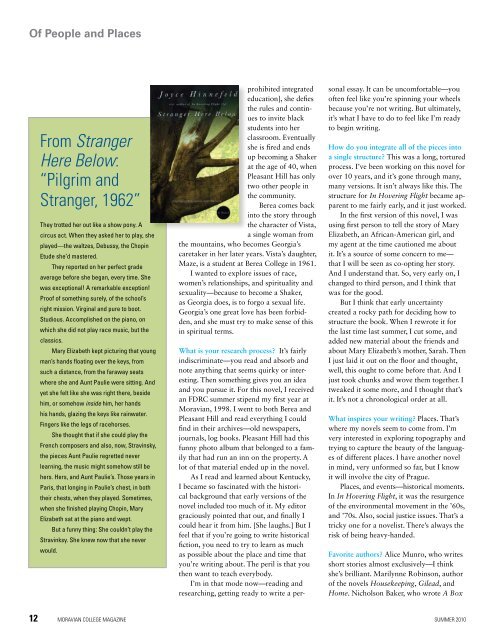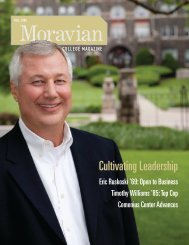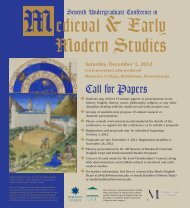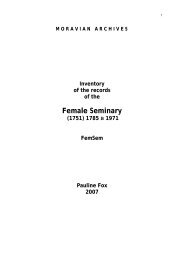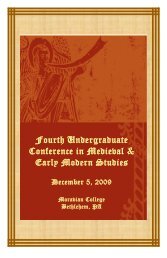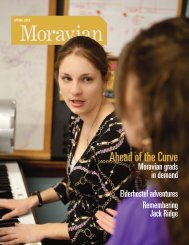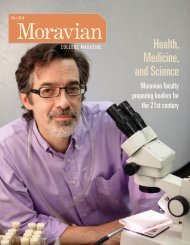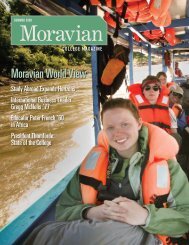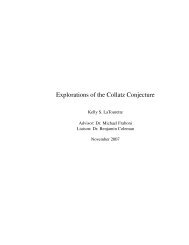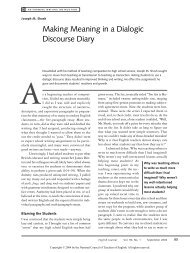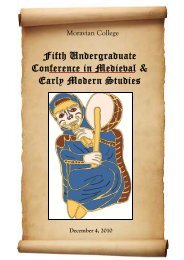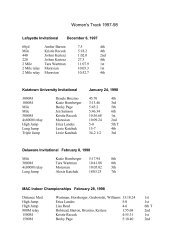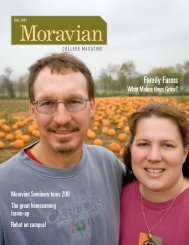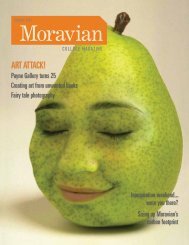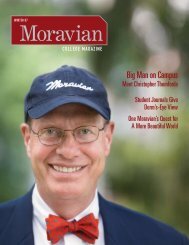Prelude: The Chipmunk Connection - Moravian College
Prelude: The Chipmunk Connection - Moravian College
Prelude: The Chipmunk Connection - Moravian College
You also want an ePaper? Increase the reach of your titles
YUMPU automatically turns print PDFs into web optimized ePapers that Google loves.
Of People and Places<br />
From Stranger<br />
Here Below:<br />
“Pilgrim and<br />
Stranger, 1962”<br />
<strong>The</strong>y trotted her out like a show pony. A<br />
circus act. When they asked her to play, she<br />
played—the waltzes, Debussy, the Chopin<br />
Etude she’d mastered.<br />
<strong>The</strong>y reported on her perfect grade<br />
average before she began, every time. She<br />
was exceptional! A remarkable exception!<br />
Proof of something surely, of the school’s<br />
right mission. Virginal and pure to boot.<br />
Studious. Accomplished on the piano, on<br />
which she did not play race music, but the<br />
classics.<br />
Mary Elizabeth kept picturing that young<br />
man’s hands floating over the keys, from<br />
such a distance, from the faraway seats<br />
where she and Aunt Paulie were sitting. And<br />
yet she felt like she was right there, beside<br />
him, or somehow inside him, her hands<br />
his hands, glazing the keys like rainwater.<br />
Fingers like the legs of racehorses.<br />
She thought that if she could play the<br />
French composers and also, now, Stravinsky,<br />
the pieces Aunt Paulie regretted never<br />
learning, the music might somehow still be<br />
hers. Hers, and Aunt Paulie’s. Those years in<br />
Paris, that longing in Paulie’s chest, in both<br />
their chests, when they played. Sometimes,<br />
when she finished playing Chopin, Mary<br />
Elizabeth sat at the piano and wept.<br />
But a funny thing: She couldn’t play the<br />
Stravinksy. She knew now that she never<br />
would.<br />
prohibited integrated<br />
education], she defies<br />
the rules and continues<br />
to invite black<br />
students into her<br />
classroom. Eventually<br />
she is fired and ends<br />
up becoming a Shaker<br />
at the age of 40, when<br />
Pleasant Hill has only<br />
two other people in<br />
the community.<br />
Berea comes back<br />
into the story through<br />
the character of Vista,<br />
a single woman from<br />
the mountains, who becomes Georgia’s<br />
caretaker in her later years. Vista’s daughter,<br />
Maze, is a student at Berea <strong>College</strong> in 1961.<br />
I wanted to explore issues of race,<br />
women’s relationships, and spirituality and<br />
sexuality—because to become a Shaker,<br />
as Georgia does, is to forgo a sexual life.<br />
Georgia’s one great love has been forbidden,<br />
and she must try to make sense of this<br />
in spiritual terms.<br />
What is your research process? It’s fairly<br />
indiscriminate—you read and absorb and<br />
note anything that seems quirky or interesting.<br />
<strong>The</strong>n something gives you an idea<br />
and you pursue it. For this novel, I received<br />
an FDRC summer stipend my first year at<br />
<strong>Moravian</strong>, 1998. I went to both Berea and<br />
Pleasant Hill and read everything I could<br />
find in their archives—old newspapers,<br />
journals, log books. Pleasant Hill had this<br />
funny photo album that belonged to a family<br />
that had run an inn on the property. A<br />
lot of that material ended up in the novel.<br />
As I read and learned about Kentucky,<br />
I became so fascinated with the historical<br />
background that early versions of the<br />
novel included too much of it. My editor<br />
graciously pointed that out, and finally I<br />
could hear it from him. [She laughs.] But I<br />
feel that if you’re going to write historical<br />
fiction, you need to try to learn as much<br />
as possible about the place and time that<br />
you’re writing about. <strong>The</strong> peril is that you<br />
then want to teach everybody.<br />
I’m in that mode now—reading and<br />
researching, getting ready to write a per-<br />
sonal essay. It can be uncomfortable—you<br />
often feel like you’re spinning your wheels<br />
because you’re not writing. But ultimately,<br />
it’s what I have to do to feel like I’m ready<br />
to begin writing.<br />
How do you integrate all of the pieces into<br />
a single structure? This was a long, tortured<br />
process. I’ve been working on this novel for<br />
over 10 years, and it’s gone through many,<br />
many versions. It isn’t always like this. <strong>The</strong><br />
structure for In Hovering Flight became apparent<br />
to me fairly early, and it just worked.<br />
In the first version of this novel, I was<br />
using first person to tell the story of Mary<br />
Elizabeth, an African-American girl, and<br />
my agent at the time cautioned me about<br />
it. It’s a source of some concern to me—<br />
that I will be seen as co-opting her story.<br />
And I understand that. So, very early on, I<br />
changed to third person, and I think that<br />
was for the good.<br />
But I think that early uncertainty<br />
created a rocky path for deciding how to<br />
structure the book. When I rewrote it for<br />
the last time last summer, I cut some, and<br />
added new material about the friends and<br />
about Mary Elizabeth’s mother, Sarah. <strong>The</strong>n<br />
I just laid it out on the floor and thought,<br />
well, this ought to come before that. And I<br />
just took chunks and wove them together. I<br />
tweaked it some more, and I thought that’s<br />
it. It’s not a chronological order at all.<br />
What inspires your writing? Places. That’s<br />
where my novels seem to come from. I’m<br />
very interested in exploring topography and<br />
trying to capture the beauty of the languages<br />
of different places. I have another novel<br />
in mind, very unformed so far, but I know<br />
it will involve the city of Prague.<br />
Places, and events—historical moments.<br />
In In Hovering Flight, it was the resurgence<br />
of the environmental movement in the ’60s,<br />
and ’70s. Also, social justice issues. That’s a<br />
tricky one for a novelist. <strong>The</strong>re’s always the<br />
risk of being heavy-handed.<br />
Favorite authors? Alice Munro, who writes<br />
short stories almost exclusively—I think<br />
she’s brilliant. Marilynne Robinson, author<br />
of the novels Housekeeping, Gilead, and<br />
Home. Nicholson Baker, who wrote A Box<br />
12 MORAVIAN COLLEGE MAGAZINE SUMMER 2010


